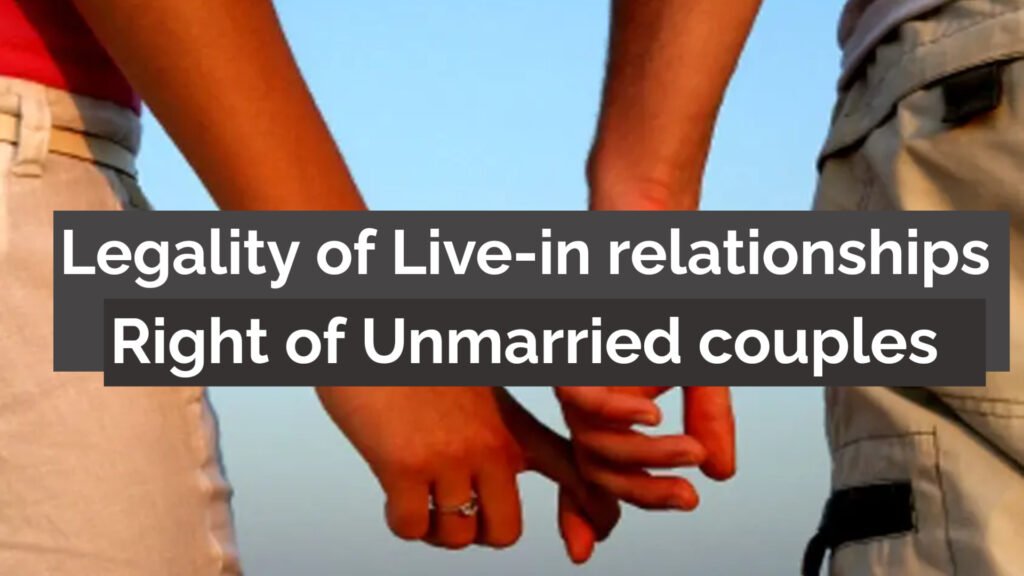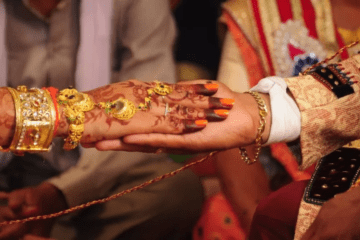Legal Rights and Duties of Unmarried couples Rights of Unmarried couples
Article 19 of the Indian constitution provides protection of certain Rights regarding freedom of speech, etc-
1.All citizens shall have the right
a. To freedom of speech and expression;
b. To assemble peaceably and without arms;
c. To form associations or unions or co-operative societies;
d. To move freely throughout the territory of India
e. To reside and settle in Amy Parr of the territory of India
f. To practice any profession, or to carry on Amy occupation, trade or business.

Article 19 of the Constitution provides freedom but these freedom comes with certain restrictions imposed by law such for example : if by any law or notification for time being in force imposes any restrictions eg. Covid Guidelines
Similary under section 294 of IPC ( obscene acts and songs)- Whoever, to the annoyance of others
(a) does any obscene act in any public place or
(b) sings, recites or utters any obscene song, bailad or words, in or near any public place, shall be punished with imprisonment of either description for a term which may extend to three months, or with fine, or with both.
Article 21 of the Constitution provides protection of life and personal liability- No person shall be deprived of his life pr personal liberty except according to procedure established by law.
It also includes Right to Privacy held in K.S Puttaswamy v. Union of India.
When we go through constitution and different laws, it is clear that there is no law, even constitution which stand against the Unmarried couple’s, the Article 19 and 21 protect their rights.
Some of the rights of Unmarried couples are:
1. No law in the country denies an Unmarried couple a stay In a hotel. The only requirement is that they must be 18 years of Age and have valid Age proof. However, checking-in a couple is at the discretion of the Hotel/ Manager.
2. Unmarried couples from the same city can check into a hotel room
3. No law forbides an Unmarried couple to rent a house in India.
4. The Constitution of India or any other statute does not restrict Unmarried couples sitting in a public place.
5. The couples has all the rights to conduct themselves in a way they want to within the closed premises. The police cannot harass Unmarried couple for engaging in consensual sex in private place.
6. In S.P.S Balasubramanyam v. Suruttayan, the Supreme Court has held the legitimacy of children born out of live-in relationships where the couple has been cohabitation for a considerable period of time.
7. The Protection of women from Domestic violence Act, 2005 acknowledges the right of Partners in a live-in Relationship to get protection from abusive relationships. Live-in Relationships got legal Recognation through Domestic violence Act 2005, for the first time.
DVA Act ascribed rights qnd protections to these female who are not legally married but are living with an Unmarried male individual in a relationship like that of a marriage.
Some of the section of Indian Penal Code also activate when a police man or person or group comes to harass Unmarried couples, these are :
Section 166 of IPC states that, Public servant disobeying law, with intent to cause injury to any person.—Whoever, being a public servant, knowingly disobeys any direction of the law as to the way in which he is to conduct himself as such public servant, intending to cause, or knowing it to be likely that he will, by such disobedience, cause injury to any person, shall be punished with simple imprisonment for a term which may extend to one year, or with fine, or with both.
Section 323 states Punishment for voluntarily causing hurt. —Whoever, except in the case provided for by section 334, voluntarily causes hurt, shall be punished with imprisonment of either description for a term which may extend to one year, or with fine which may extend to one thousand rupees, or with both.
Section 504 states for Intentional insult with intent to provoke breach of the peace.—Whoever intentionally insults, and thereby gives provocation to any person, intending or knowing it to be likely that such provocation will cause him to break the public peace, or to commit any other offence, shall be punished with imprisonment of either description for a term which may extend to two years, or with fine, or with both.
Section 506 of IPC talks about Punishment for criminal intimidation.—Whoever commits, the offence of criminal intimidation shall be punished with imprisonment of either description for a term which may extend to two years, or with fine, or with both; If threat be to cause death or grievous hurt, etc.—And if the threat be to cause death or grievous hurt, or to cause the destruction of any property by fire, or to cause an offence punishable with death or 1[imprisonment for life], or with imprisonment for a term which may extend to seven years, or to impute, unchastity to a woman, shall be punished with imprisonment of either description for a term which may extend to seven years, or with fine, or with both.
Conclusion
The law in India was never against the cohabitation of Unmarried copulation who are above 18 years of Age, but the stereotypes had made this subject a taboo which has created lots of negative thoughts regarding the rights available to Unmarried couples. The moral policing has given birth to fear amongst teenagers who wish to cohabit.
The thought that checking into hotel if you’re an unmarried couple stays into the minds of these young couples. There are no laws which prohibit young couples who have attained the age of 18 years to live together. The Constitution under article 19 and 21 protects your freedoms and the sections like Section 166 of IPC gives for criminal liability on public officers such as police officials who harass people.
The rights mentioned above are for such young couples to enjoy and to live their life’s in the way they desire!




0 Comments